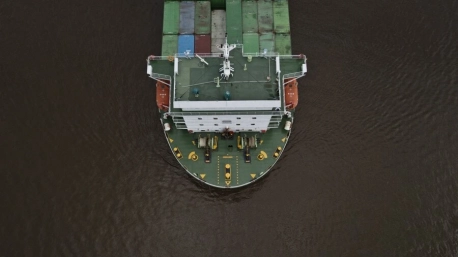The partnership between Singapore and Rotterdam to create the Green and Digital Shipping Corridor (GDSC) signifies a major step towards a sustainable and technologically advanced maritime industry. Positioned along one of the most heavily trafficked maritime routes in the world, this initiative is pivotal in addressing the maritime sector’s significant greenhouse gas emissions through innovation.With a focus on decarbonization and digitalization, the GDSC takes a proactive stance on environmental care and operational efficiency in global shipping. It illustrates the impact of international collaborations in making progress towards eco-friendly and smarter maritime logistics. As the industry responds to environmental imperatives, the initiative serves as a guiding light, steering the shipping sector to a future that is both greener and more digitized, setting an example for others to follow.This Singapore-Rotterdam endeavor holds the potential to lead to cleaner oceans and port cities, diminished environmental impact from shipping activities, and better resource management. The joint venture is a step towards transforming the maritime industry by leveraging digital advancements towards a low-carbon, sustainable commerce model.
Pioneering Maritime Decarbonization Through Global Collaboration
The Birth of the Green and Digital Revolution in Shipping
The Singapore-Rotterdam GDSC stands as a symbol of commitment to change. With the participation of industry leaders, technological experts, and regulatory authorities, this initiative aims to replace traditional practices with sustainable methods across international shipping. This cooperative venture seeks tangible solutions rather than mere ideals.It encompasses the involvement of major shipping companies, fuel providers, and numerous industry associations, all supported by financial investments and policy endorsements that are crucial for the realization of green projects. This broad cooperation marks a significant agenda towards cleaner maritime operations.
Milestones and Commitments of the GDSC Initiative
The GDSC initiative, with significant partners like Hapag-Lloyd and the A*STAR Centre for Maritime Digitalisation, is making headway toward sustainable maritime practices. This collaboration strengthens the initiative and brings it closer to achieving its emission reduction targets of 20-30% over the next decade starting from 2022.The convergence of stakeholders signifies a pledge to collective growth through technological innovation and industry consensus. Such partnerships are key for the widespread acceptance of new practices and technologies, forming the foundation for achieving emission targets. Moving forward, the initiative maintains its focus on cutting-edge technology and cohesive industry strategies.
Fueling the Future: Alternative Energy Sources for Shipping
Leading the Charge with Bio-LNG and Methanol
Bio-LNG and methanol have emerged as potential alternatives to traditional maritime fuels due to their cleaner burning properties. Ongoing pilot projects demonstrate the environmental advantages and feasibility of these fuels, paving the way for their integration into shipping operations.Groups like SEA-LNG are at the forefront, establishing certification standards for bio-methane to ensure the transparent and effective implementation of these alternative fuels. This groundwork is vital for their widespread adoption.
The Potential of Ammonia and Hydrogen for a Clean Transition
Ammonia and hydrogen are seen as the cornerstones of the future maritime fuel landscape within the GDSC. With strategic development of vessel models suitable for hydrogen use and life-cycle assessment frameworks for ammonia, the initiative shows a clear dedication to seamlessly integrating these sources into the fuel mix.These steps are part of a meticulous plan to understand the overall impact of these fuels, ensuring a transition that truly accounts for environmental sustainability throughout the entire supply chain.
The Digital Edge in Maritime Sustainability
Standardization and Data Sharing for Enhanced Efficiency
The GDSC calls for enhanced operational efficiency with digital advancements, such as Port Call Optimization. This tech facilitation leads to well-coordinated information exchange, streamlining maritime operations and fostering the energy transition through knowledgeable decision-making.The initiative aligns technological progress with regulatory standards, facilitating the integration of digital tools crucial for a sustainable shipping ecosystem.
Digital Strategies to Track and Optimize Emissions
Within the GDSC, digital strategies are integral for emission monitoring and maximizing maritime operation efficiency. Utilizing metrics and open data, the industry can harmonize operational performance with environmental concerns.Digital transformation marks a potential overhaul in shipping logistics, central to achieving sustainability in maritime activities. Extra emphasis on digital innovation indicates a promising trajectory towards a smarter, cleaner maritime industry.This progression towards digital solutions and data openness offers the maritime sector an opportunity to adopt operations that are both intelligent and kinder to the environment. Such advancements are forging a path for a maritime industry that is more efficient and responsible globally.
Moving Forward: Progressive Steps and Industry Transformation
Realizing Concrete Outcomes and Implementing Frameworks
To achieve lasting sustainability in shipping, the GDSC has established frameworks and standards that contribute to substantial progress. It’s not just about setting goals but making tangible advancements towards eco-friendliness.Adopting a hands-on approach, the GDSC fosters collaboration and implements feasible steps, fostering an industry-wide transformation. This proactive movement facilitates a shift in maritime operations, embracing a future characterized by genuine environmental responsibility.
Collaborative Innovations Setting Sail
The GDSC represents the ongoing advancement of technology and cooperative efforts. Figures such as Teo Eng Dih of the MPA and Boudewijn Siemons of the Rotterdam Port advocate for a future where Singapore and Rotterdam lead the maritime sector’s journey towards sustainability and innovation.As a collective, this initiative is more than an idea; it actively integrates eco-friendly practices into maritime operations. It’s a journey marked by collaborative international efforts and innovative solutions, charting a new course for the global maritime industry.









